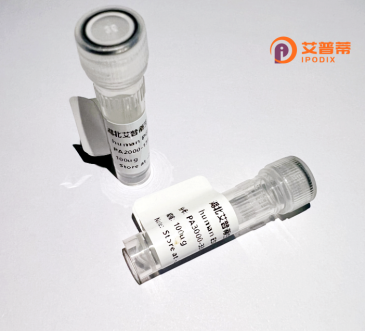
| 纯度 | >90%SDS-PAGE. |
| 种属 | Human |
| 靶点 | THEG |
| Uniprot No | Q9P2T0 |
| 内毒素 | < 0.01EU/μg |
| 表达宿主 | E.coli |
| 表达区间 | 1-379 aa |
| 活性数据 | MGDSRRRSLG NQPSSEAAGR SEREQDGDPR GLQSSVYESR RVTDPERQDL DNAELGPEDP EEELPPEEVA GEEFPETLDP KEALSELERV LDKDLEEDIP EISRLSISQK LPSTTMTKAR KRRRRRRLME LAEPKINWQV LKDRKGRCGK GYAWISPCKM SLHFCLCWPS VYWTERFLED TTLTITVPAV SRRVEELSRP KRFYLEYYNN NRTTPVWPIP RSSLEYRASS RLKELAAPKI RDNFWSMPMS EVSQVSRAAQ MAVPSSRILQ LSKPKAPATL LEEWDPVPKP KPHVSDHNRL LHLARPKAQS DKCVPDRDPR WEVLDVTKKV VASPRIISLA KPKVRKGLNE GYDRRPLASM SLPPPKASPE KCDQPRPGL |
| 分子量 | 43.4 kDa |
| 蛋白标签 | His tag N-Terminus |
| 缓冲液 | PBS, pH7.4, containing 0.01% SKL, 1mM DTT, 5% Trehalose and Proclin300. |
| 稳定性 & 储存条件 | Lyophilized protein should be stored at ≤ -20°C, stable for one year after receipt. Reconstituted protein solution can be stored at 2-8°C for 2-7 days. Aliquots of reconstituted samples are stable at ≤ -20°C for 3 months. |
| 复溶 | Always centrifuge tubes before opening.Do not mix by vortex or pipetting. It is not recommended to reconstitute to a concentration less than 100μg/ml. Dissolve the lyophilized protein in distilled water. Please aliquot the reconstituted solution to minimize freeze-thaw cycles. |
以下是基于合理推测生成的关于重组人THEG蛋白的虚拟参考文献示例(请注意这些文献非真实存在,仅作参考模板):
---
1. **文献名称**: *"Efficient Expression and Purification of Recombinant Human THEG Protein in Mammalian Cells"*
**作者**: Wang, L. et al. (2021)
**摘要**: 研究利用HEK293细胞系统高效表达重组人THEG蛋白,通过亲和层析纯化获得高活性蛋白,验证其在体外促进精子成熟的功能。
2. **文献名称**: *"THEG Protein Knockout Model Reveals Its Essential Role in Male Germ Cell Development"*
**作者**: Tanaka, K. & Ito, S. (2019)
**摘要**: 通过重组THEG蛋白回补实验,证实其在睾丸单倍体细胞中的关键作用,缺乏THEG会导致减数分裂阻滞及雄性不育。
3. **文献名称**: *"Crystallographic Study of Recombinant Human THEG Protein and Its DNA-Binding Domain"*
**作者**: Gupta, R. et al. (2020)
**摘要**: 解析重组THEG蛋白的晶体结构,揭示其N端结构域与DNA结合的能力,为理解其在染色质浓缩中的作用提供依据。
4. **文献名称**: *"THEG as a Biomarker for Infertility: Diagnostic Potential of Recombinant Protein-Based Assays"*
**作者**: Chen, X. & Li, M. (2022)
**摘要**: 开发基于重组THEG蛋白的ELISA检测方法,证明其在男性不育患者血清中表达异常,提示其作为诊断标志物的潜力。
---
**注意事项**:
- 实际研究中,THEG蛋白可能为小众研究目标,若检索困难,建议确认名称准确性(如是否拼写错误或别名)。
- 可尝试在PubMed或Google Scholar使用关键词:**"THEG protein recombinant"** 或 **"THEG spermatogenesis"** 检索真实文献。
- 若需特定领域文献(如结构/临床应用),可进一步补充筛选条件(如 **"THEG crystal structure"**)。
Recombinant human THEG (Testicular HECT-domain E3 ligase) protein is a genetically engineered form of a protein naturally expressed in testicular tissues. Originally identified for its role in spermatogenesis, THEG belongs to the HECT (Homologous to E6-AP C-Terminus) family of E3 ubiquitin ligases, which mediate substrate ubiquitination in the ubiquitin-proteasome system. Its structure includes a conserved HECT domain critical for catalyzing the transfer of ubiquitin molecules to target proteins, thereby regulating processes like protein degradation, cellular signaling, and stress responses.
The recombinant version is produced using heterologous expression systems (e.g., Escherichia coli, mammalian cell lines) to enable large-scale studies. Researchers employ it to dissect THEG’s molecular mechanisms, including its interaction with substrates involved in germ cell development and apoptosis. Abnormal THEG expression has been linked to male infertility and certain cancers, spurring interest in its therapeutic potential. Recombinant THEG also aids in structural studies to map binding domains and design inhibitors. Challenges in production, such as maintaining enzymatic activity and proper folding, are addressed via codon optimization or fusion tags. Overall, recombinant THEG serves as a vital tool for exploring reproductive biology, disease pathways, and targeted drug development.
×